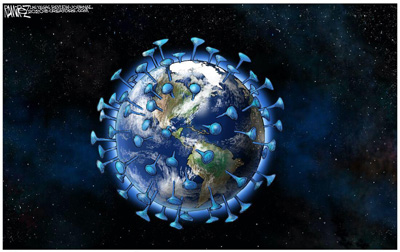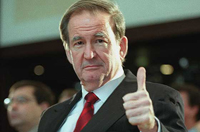Can This Pandemic Usher in a New Era?
Patrick J. Buchanan
 To fight the coronavirus at home, France is removing all military forces from Iraq. To fight the coronavirus at home, France is removing all military forces from Iraq.
When NATO scaled back its war games in Europe because of the pandemic, Russia reciprocated. Moscow announced it would cancel its war games along NATO’s border.
Nations seem to be recognizing and responding to the grim new geostrategic reality of March 2020: The pandemic is the real enemy of us all, and while we fight it, each in his own national corner, we are in this together.
Never allow a serious crisis to go to waste, said Barack Obama’s chief of staff Rahm Emanuel during the financial crisis.
Emanuel was echoed this month by House Majority Whip Rep. James Clyburn, who called the coronavirus crisis “a tremendous opportunity to restructure things to fit our vision.”
What Clyburn had in mind is what Democrats advanced as their alternative to the $2.2 trillion emergency bill. It was designed to force President Trump either to swallow it whole or to take responsibility for vetoing a critical transfusion of federal funds to keep the economy alive.
Among the items stuffed in the Democrats’ proposal:
-
A $15-an-hour minimum wage imposed on companies receiving funds. Blanket loan forgiveness of $10,000 for students. New tax credits for solar and wind energy. Full funding of Planned Parenthood. Federal dollars for fetal tissue research.
-
$300 million for PBS, which has been promoting the LBGT agenda to school kids. Mandating “diversity” on corporate boards as a condition of companies receiving funds. Election “reforms” to increase Democratic turnout. Insistence that airlines, to get a bailout, offset carbon emissions from jet engines. $35 million for the Kennedy Center.
Majority Leader Mitch McConnell and congressional Republicans ash-canned almost the leftist wish list.
But Trump should go further, turn the tables, and seize this crisis to do what he was elected to do — impose a new foreign policy.
Isolate America, not from the world, but from the world’s wars.
The New York Times and Washington Post editorialized Thursday for an easing of the economic sanctions we have imposed on Iran.
This would be a humanitarian gesture when Iran is suffering more than any country in the Middle East from the virus. More than that, it would be a statement that America is not at war with the Iranian people.
This unilateral gesture by Trump, asking nothing in return except negotiations, would put the onus for Iran’s isolation squarely with the ayatollah and his regime.
As for Vladimir Putin’s cancellation of war games in response to NATO’s cancellation, Trump could seize upon this as an opening to engage Russia as candidate Trump promised to do.
Does anyone believe Putin wants a war with NATO?
Should he do so, does anyone think Italy and Spain, two of the largest NATO allies, but both suffering greatly in the coronavirus crisis, would invoke Article V and declare war on Russia?
When Hitler was our foe, America created a wartime alliance with Stalin in the common cause of crushing the Axis powers. Liberals and leftists yet defend the Popular Front between the democracies and Stalin. If we could unite with Bolsheviks to defeat Nazis, surely we can join with Iran’s rulers to cope with and crush the coronavirus.
When, if ever, will there be a better time to make good on Trump’s campaign pledge to extricate America from the wars in Syria, Iraq and Afghanistan?
Consider also the Korean Peninsula.
Kim Jong Un has been testing rockets again over the Sea of Japan.
Transfixed by the coronavirus crisis, however, the world is paying him no attention. We should make a final offer to Kim Jong Un to pull our U.S. forces from South Korea and lift sanctions for verifiable reductions and restraints on his nuclear arsenal.
We are ready for a deal. But If Pyongyang refuses to talk, we should tell him we are going home and are allowing South Korea and Japan to develop their own nuclear weapons. And let Kim deal with them.
The coronavirus pandemic is the greatest crisis since the Cuban missile confrontation of 1962. After that crisis, John F. Kennedy sought to use the world’s brush with Armageddon to establish a detente with the Soviet Union of the Communist dictator who had put the missiles in Cuba.
Following our Cold War victory, we have not done that. Instead, we plunged into wars that were none of our business to deal with imagined threats and advance utopian causes like establishing Jeffersonian democracy in lands where tribalism and dogmatism are rooted in the very soil.
The coronavirus is the enemy Saddam Hussein never was. And the ayatollahs never had tens of millions of Americans “sheltering in place.”
What the coronavirus crisis tells us is not that we should turn our backs on the world but that, in engaging with the world, we should put our own interests first, as every nation in the world is doing now.

Patrick Buchanan has been a senior advisor to three Presidents, twice a candidate for the Republican presidential nomination, and the nominee of the Reform Party in 2000.
Born in Washington, D.C., Mr. Buchanan was educated at Gonzaga High School where he was graduated first in his class in 1956. He attended Georgetown on a full academic scholarship, and was graduated with honors in English and Philosophy in 1961, and inducted into the university’s Gold Key Society. He received a masters degree from the Graduate School of Journalism at Columbia in 1962. At 23, he became the youngest editorial writer on a major newspaper in America: The St. Louis Globe-Democrat.
After arranging a meeting with former Vice President Richard Nixon in December of 1965, Mr. Buchanan became the first full-time staffer in his legendary comeback. He traveled with the future President in the campaigns of 1966 and 1968, and to the Middle East, Africa and Israel in the immediate aftermath of the Six Day War. From January of 1969 to August of 1974, he was a Special Assistant to President Nixon, worked with the President on the Cambodian invasion speech, and with Vice President Agnew on many of his speeches on the media and student disorders. Mr. Buchanan was a member of the official US delegation to the Peoples Republic of China in 1972, and attended the Moscow-Yalta-Minsk summit of 1974. After President Nixon’s resignation, Mr. Buchanan served President Ford until October of 1974.
After leaving the White House, Mr. Buchanan became a nationally syndicated columnist, and in May of 1982 began as a panelist on NBC’s “The McLaughlin Group” and a co-host of CNN’s new show “Crossfire.”
In 1985, Mr. Buchanan returned to the White House as Director of Communications. He accompanied President Reagan to his Geneva summit with Mikhail Gorbachev and was with President Reagan in Hofde House at Reykjavik which has been described as the decisive summit of the Cold War. On leaving the White House in 1987, Mr. Buchanan returned to journalism, his syndicated column, and to “The McLaughlin Group,” “Crossfire,” and began hosting a new show, “Capital Gang” on CNN.
In December 1991, Mr. Buchanan challenged President George H. W. Bush for the Republican nomination and almost upset the President in New Hampshire, winning 3 million votes in the GOP primaries. In August 1992, Mr. Buchanan opened the Republican convention in Houston with his speech on the “culture war” which is now ranked among the most controversial in convention history. In 1996, he ran a second time for the GOP nomination, won the New Hampshire primary, and finished second to Sen. Dole, again, with three million Republican votes.
After winning the nomination of the Reform Party in 2000, Mr. Buchanan retired from politics and became again an author, columnist, and a commentator on MSNBC for almost a decade.
Mr. Buchanan has written 12 books, including seven straight New York Times bestsellers: A Republic, Not an Empire; The Death of the West; Where the Right Went Wrong, State of Emergency, Day of Reckoning, Churchill, Hitler and The Unnecessary War, and Suicide of a Superpower.
Mr. Buchanan is currently an author, columnist, chairman of The American Cause foundation, and an editor of The American Conservative. He is married to the former Shelley Ann Scarney, who was a member of the Richard Nixon’s vice presidential staff from 1959-61, and a member of the White House Staff from 1969 to 1975.
buchanan.org
| 



